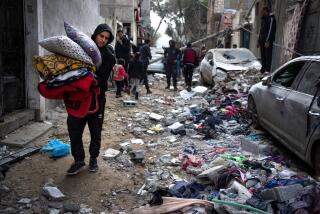Given Cover, Pakistan Can Prove Helpful
- Share via
In the coming days, the United States’ Cold War ally, Pakistan, will have some difficult decisions imposed on it as the U.S. finalizes its military response to last week’s terrorist attacks. Gen. Pervez Musharraf, Pakistan’s president, rightly has chosen to stand on the side of civilization in what will soon become a global campaign against zealotry.
As Washington narrows its options, Islamabad’s ruling moderates are damned if they help and damned if they don’t. The biggest risk to Musharraf’s moderate Islamic government is civil war. And not because Pakistan’s religious fanatics are well-armed or numerous.
The real problem lies in fundamentalist Islam’s concept of brotherhood, or ummah, before nationhood. No enlisted army officer, no matter how well-trained or how firmly instructed, is likely to turn a gun on his fellow Islamist brother in the streets rioting to rid Pakistan of the Great Satan. With little internal resistance by army enlisted personnel, the streets of Pakistan’s major city centers would be run down by Talibanized fanatics. The alternative is a Wild West gunfight that would turn Pakistan into a graveyard.
Musharraf faces the brotherhood from within as well. While no army officer at a command level would dare turn on him at such a sensitive moment in Pakistan’s history, a few wouldn’t mind if he tripped over his own shoelaces on the welcome mat inviting the United States in.
Which is why President Bush’s team must choose its final option wisely. The prudent first step in what will inevitably be a protracted war would be a plan that offers publicly plausible deniability for Pakistan while using its covert intelligence and tactical support.
Delta Force commandos and other elite U.S. Army and Marine outfits could be airlifted into Afghanistan in secret raids on the cavernous enclaves of Osama bin Laden, with the help of maps provided by Pakistani intelligence. Sleeping gas, stun grenades and other specialized weapons aimed at immobilization could be used to flush out Bin Laden’s militia while leaving intact the vital evidentiary tracks of his global network. These findings would enable U.S. intelligence to unravel his organization and put it out of business.
A captured Bin Laden and his associates could be quietly brought back to the U.S. to stand trial. This is the American way of justice. Pakistanis in the streets might be angry, but their government would not have betrayed the fundamental premise of their anger: allowing Pakistan’s soil to be used for military strikes against a people with whom ordinary Pakistanis sympathize enormously.
Destabilizing a credible if weak government in Islamabad, allowing nuclear weapons to fall into the hands of religious radicals and forgoing the enormous economic potential hidden in its dynamic people are not acceptable outcomes of the United States’ renewed engagement with Pakistan.
Musharraf has demonstrated a willingness to pay perhaps the highest price for his country. But the American people and our government must not force him to pay it for the sake of a short-term fix to what is a long-term problem.
More to Read
Sign up for Essential California
The most important California stories and recommendations in your inbox every morning.
You may occasionally receive promotional content from the Los Angeles Times.










